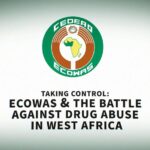ECOWAS@50 ” Defined By Unity and Resilience” , Dr Omar Alieu Touray
By Raymond Enoch.
The Economic Community of West African States (ECOWAS) today marked its 50th anniversary with ceremonies across the region and renewed calls for unity, reform, and commitment to democratic governance.
Established on May 28, 1975, in Lagos by 15 West African nations, ECOWAS was founded to promote economic integration and regional cooperation. Half a century later, it remains a key driver of peacekeeping, trade, and mobility in one of Africa’s most diverse subregions. Yet, as the celebrations unfolded, leaders and observers acknowledged the complex challenges that continue to test the institution cohesion.
In a commemorative address, H.E. Dr. Omar Alieu Touray, President of the ECOWAS Commission, lauded the achievements of the ECOWAS five decades, citing the establishment of a free movement protocol, a regional electricity market, and significant strides in trade and infrastructure.
“From that moment to this very day, our journey has been defined by resilience, unity, and purpose,” Dr. Touray said. “We have facilitated trade and connectivity, strengthened healthcare, empowered youth, and defended democracy.”
Dr. Touray emphasized that ECOWAS has become the most integrated Regional Economic Community on the African continent, representing the aspirations of more than 400 million people.
However, amid the celebrations, ECOWAS finds itself at a crossroads. A wave of military coups in recent years have limited capacity to enforce democratic norms observed by experts. Member states such as Mali, Burkina Faso, and Niger have faced suspensions over unconstitutional transitions, raising concerns about governance and regional stability.
The region also grapples with terrorism, economic disparities, climate-related crises, and high youth unemployment—challenges that have led to renewed calls for structural reform.
“Time to Deliver on Key Promises,” Say Stakeholders
Dr. Kojo Impraim, Programme Director of the Media Foundation for West Africa, stressed the urgency for ECOWAS to go beyond symbolic unity and implement long-delayed initiatives.
“It’s time to give true meaning to a common currency for economic take-off, and to establish a regional communications network that connects all West African nations seamlessly,” Dr. Impraim stated.
He further called on member states to invest in youth development, address unemployment, and strengthen democratic institutions rooted in the rule of law. He also emphasized the role of independent media in countering disinformation, supporting peace, and promoting digital rights.
A Vision for the Future
The 50th anniversary is being positioned not only as a celebration but also as a moment of reflection. Leaders and civil society groups agree that ECOWAS must now focus on deepening integration, implementing the African Continental Free Trade Area (AfCFTA), and ensuring inclusive growth.
“The future of ECOWAS must be brighter, greener, more inclusive, and more secure,” said Dr. Touray. “It must be anchored in innovation, sustainability, and the unwavering belief that we are stronger together.”
As ECOWAS steps into its next half-century, its legacy of peacekeeping and integration stands as both an inspiration and a reminder of what remains unfinished. The task ahead requires renewed political will, citizen engagement, and institutional strength to transform ECOWAS into a truly people-centered union—one capable of securing peace, prosperity, and progress for all.









